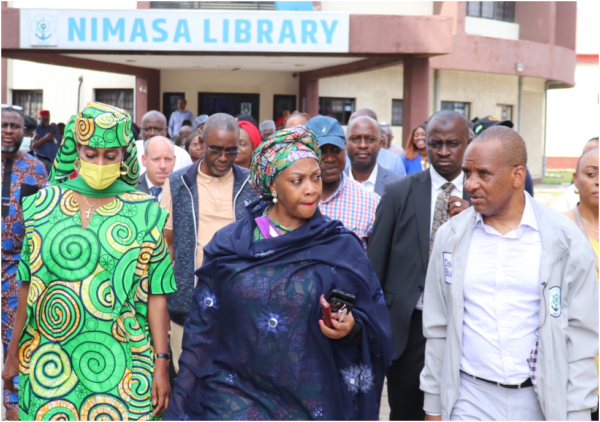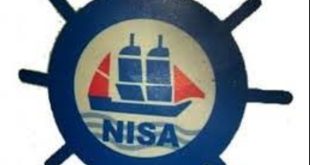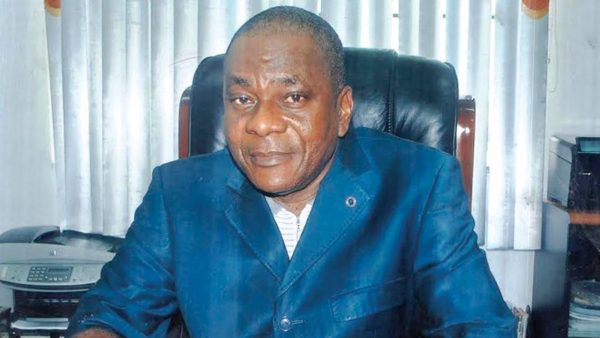By Frank Odinukaeze & Chioma Akabuogu

· $3.2billion e-Customs Project padded with $100million in two years
· How Finance Minister made up with CG over interest
The Minister of State for Transportation, Senator Gbemisola Saraki has said she kept aloof from the maritime industry obligations in the last three years while the Minister of Transportation, Rt. Hon. Rotimi Amaechi was in office because she was officially assigned the Road transport subsector to oversee, not the maritime industry.“ I was not in charge of the Maritime sector, I was handling the Road sector,”she asserted.
The Minister was responding to why it took her over three years to perform her duty and visiting the Lagos ports less than one year to the end of President Mohammadu Buhari’s regime at a press briefing on Friday to mark the end of her one week tour of the ports.

MMS Plus got a wave of reactions from some industry operators who felt the visit would yield no value to the industry within the limited life span of Buhari’s regime especially against the background of the expected announcement of a new Minister of Transportation.
Her claim contradicts the several public statements by Amaechi that the Minister of State had been given the responsibility of supervising the Maritime sector while he took on the Railway to ensure delivery compliance.
But Sen. Saraki was hardly seen perform her statutory duties in the maritime industry raising concerns and allusions to interval cleavages between both ministers, a development that laid credence to an earlier predictions by many industry observers that both personalities could be locked in dissension with time because of their seeming character disposition.
The Minister who gave reasons for her visit in company of some directors in the ministry said, Today is my fifth week of assuming the leadership of the Ministry of Transportation. We came to take stock of the sector. We had taken the stock of the Road sector.”
On her impression of the port, she said,”Apapa and Tin Can ports are in terrible need of repairs. We will go and come back for repairs. We have the short, medium and long term plans for this. We need to start with rehabilitation here. Another problem here is power.
The week-long programme had various stakeholders in attendance on assigned day of meeting. Among the stakeholders are, women groups in maritime, terminal operators, stevedores, maritime workers union groups, haulage and transport operators, maritime lawyers,freight forwarders.
In another development, as the new e-customs modernization project came under heavy fire with barrages of criticisms from stakeholders and industry players , following its announcement recently by the Nigeria Customs Service(NCS),new facts have emerged as to why the Finance Minister, Zainab Ahmed, who hitherto had never sat for any Board room meetings with the Comptroller General of Customs (CGC), Col. Hameed Ali(rtd), since he became the CG of Customs to take policy decisions, suddenly and hurriedly agreed to the e-customs concession agreement.
MMS Plus scooped that apart from political considerations and exigencies, self aggrandizement and personal interest played a major role in the 20 years projected revenue of $176bn in the e-customs project.
The struggle to have a stake in the e-customs project created a theatre-of- the-absurd in which the Central Bank of Nigeria(CBN), Federal Ministry of Finance(FMF) and NCS engaged in a game of chase for supremacy of ideas with the attendant backlash on shippers and consumers. Feeling neglected, the CBN introduced the e-invoicing project, while the finance ministry came up with Vehicle Registration Scheme(V-Reg),all aimed at digitizing clearing process but NCS consequently introduced the Vehicle Identification Number (VIN), as a synthesis of input for all the automation initiatives and process with vehicles as a selling point. This left stakeholders wondering what else is left undone that makes the e-customs project tangentially compelling.
It was observed however that an additional sum of $100,000,000 was added to the e-customs project between the year 2020 and 2022 when the project was first made public. It was $3.1billion then but now $3.2billion as the project fund expected from the African Finance Corporation(AFC). The change in figure and the nature of fund are still mired in secrecy.
MMS Plus gathered that the power play and crisis that engulfed the two agencies, ministry and some members of the concession consortium over interest though not visible to the public, led the Finance Minister Zainab Ahmed to report that the initial lead concessionaire, Bionica Technology had pulled out of the process owing to disagreement in the sharing stakes of the project.
There was long-drawn cold war between the Customs CG and the Federal Minister of Finance over insubordination but when the e-customs idea was taken to the presidency, our source revealed that the President directed Zainab Ahmed to undertake a review of the project with the CG of Customs.
According to our source,” Before now, the CG of Customs, Col. Hameed Ali, had never sat down with the Finance Minister in a board room meeting to take a policy decision.
Recall that two years ago, the Federal Executive Council (FEC) gave initial approval to the modernization project of the NCS also known as e-customs project.
Recall also that the Finance Minister recently in a statement stated that the implementation of the e-customs project would now commence since the party that was uncomfortable with the agreement had opted out, despite efforts by the government through the office of the Attorney General of the Federation, (AGF) to mediate. What the Finance Minister however, did not tell Nigerians is the reasons or factors that made Bionica Technology not to be comfortable with the concession agreement.
According to our source, the Finance Minister and the CG represented the project to the President advising on what should be done. With the various interests said to have been represented the Finance Minister made a formal presentation of the proposal to FEC for consideration.
Observers have since picked holes in the whole process that led to the concession agreement. They pointed out that the process that gave rise to the agreement was fraught with irregularities as there was no official or public bidding for the concession of a whole valuation department of customs to a foreign company, Huawei Technology. The process according to observers, was erroneous and smacks off ripping of the nation.
The question stakeholders are asking are: Was there any feasibility study done to ascertain the workability and viability of the project before rushing to sign the agreement? Why didn’t the Customs sensitize the public, engage relevant stake- holders before rushing to sign the concession agreement?
Again, they posit that the Finance Minister has not revealed to Nigerians the content of the concession agreement other than that the project would yield revenue to the tune of $176bn in 20 years.
Currently, NCS and two of the founding members of the project are locked in an Abuja court, with a restraining order already granted against the Service.
However, the National Public Relations Officer(PRO)of the NCS, Mr. Tim Bomodi has come out to defend the process and solicited support for the initiative as it would enhance customs operations for imports and exports. Nigerians are however at a loss as to how this project that is 90 per cent import driven can enhance the export.
According to Bomodi,“As efficient as NCIS 11 is, it still has limitations. We complain about alerts and serial interventions on transactions because we have a less than efficient audit mechanism; with this system, examinations and release of imports and exports will be subjected to the feeds across multiple platforms. This will check arbitrary decision making at all levels and will guide interventions”
Bomodi said many aspects of the customs job are still not automated. A classic example is escort operations for goods in transit.
“Today, because of a shortfall in manpower, requests for escort takes quite a while before arrival. This causes delays in the delivery of transit containers. With an automated e-tracking system, the delays will be a thing of the past,” he said.
Observers however differ on the Customs PRO’s position or submission. They argue that over the years, Customs had introduced so many systems that would have worked if properly managed, but because of corruption these systems did not work.
 MMS PLUS NG – Maritime, Aviation, Business, Oil and Gas News Online Newspaper with coverage in Maritime, Oil and Gas, Aviation, Power and Energy as well as Financial News
MMS PLUS NG – Maritime, Aviation, Business, Oil and Gas News Online Newspaper with coverage in Maritime, Oil and Gas, Aviation, Power and Energy as well as Financial News









